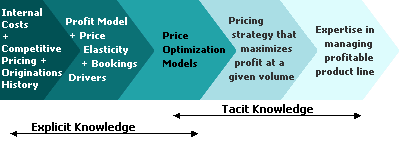Part I: Why India can be global knowledge economy leader
In Part I of this article, I put forth the vision that India can become a leader in the global knowledge economy by 2010. In this part, I plan to define the skills and expertise that one needs to have to succeed in the knowledge economy and propose several strategies to make these available in India to meet the expected explosion in demand.
The key knowledge that resides within organisations may be broadly classified into two types:
- Explicit knowledge which may be documented in manuals or stored in databases within the company; and
- Tacit knowledge which resides within people and represents skills, insights and judgments, technical expertise and practical know-how. It is acquired through personal experience, and is much more difficult to capture or document.
A good way to understand what this means in practice is to take a couple of specific areas of knowledge management and define the steps along the knowledge continuum.
Customer-driven Product Strategy

Pricing Strategy for Financial Services

While I used examples from my own experience in marketing and analytics, the dichotomy between and explicit and tacit knowledge persists for almost any knowledge process, including non-technical areas such as pharmaceuticals R&D and legal.
Let us now turn our attention to the challenge of finding the qualified people to staff the various steps involved in the outsourced knowledge process, starting with tacit knowledge which is harder to find.
Tacit knowledge resources
Only a small portion of their expected demand for tacit knowledge experts can be filled with people who are already in India. Fortunately, there are many Indians who have reached middle management and executive positions in North America, who have the domain expertise, the soft skills and successful track records of executing complex solutions.
- Participate in the PanIIT 2006 Global Conference! Click here to register now!
These are the kind of people who need to be targetted by the India-based KPOs (knowledge process outsourcing) to return to India to take up leadership positions in their organisations.
Prime Minister Manmohan Singh appears to be thinking along the same lines. In a recent speech he said: "As the Indian economy modernises and grows, we should expect a reverse migration of talent, especially from within the Diaspora. What I would call a 'reverse brain drain' is in the making. How can we encourage this? What domestic policy changes should we make to encourage this?"
Explicit knowledge resources
The India-based emerging KPO organisations have been meeting their explicit knowledge needs by hiring IIT (Indian Institute of Technology) and IIM (Indian Institute of Management) graduates and there are not enough of them to meet the full demand. So, different companies in the KPO industry are trying out different strategies to find the right candidates from a broader pool of Indian graduates.
At this point there is no joint screening test along the lines of the Nasscom Assessment of Competence (NAC) -- an assessment and certification framework to ensure a steady supply of quality professionals to meet the present and future requirements of the ITES-BPO industry.
The KPO could in fact develop their own screening exam in the future, or they could be creative and leverage two highly popular exams to do their preliminary screening:
a) 190,000 students with at least a Bachelor's degree appeared for the Common Admissions Test to the IIMs of which 1,200 will finally get admitted.
b) 300,000 twelfth-grade students took the Joint Entrance Exam (JEE) for the Indian Institutes of Technology this year, of which around 5,000 get admission.
Why not apply predictive analytics to the results of these exams to short-list high potential candidates through 2010? When implemented, those who did not get admitted to the IITs or IIMs could opt-in to receive a percentile ranking of their aptitude and skills for gainful employment in the KPO industry.
This score, when supplemented with behavioural measures such as persistence, determination, teamwork and ability to communicate effectively in English and other foreign languages, should help the KPO industry find people who are committed to a career in knowledge management CAT (Common Admission Test) applicants can be screened for employment right away.
This year's JEE (Joint Engineering Examination) applicants could be screened now and trained in the unique skills required in KPO organisations through online tertiary education courses which they can take while they are completing their Bachelor's degree at colleges throughout India.
Through a merit-based process of selection, on-going evaluation, and elimination, at least 10,000 good candidates can be identified in 2007, and going up to 30,000 per year by 2010.
Building a knowledge-driven nation
Why I have focussed on India's short-term challenge of competing with other nations for leadership by 2010, some of the best minds in the world are already actively working on making India a knowledge driven nation by 2020.
The Indian prime minister has constituted the National Knowledge Commission, with the mandate of devising and guiding reforms that will transform India into a strong and vibrant knowledge economy in the coming years. The commission was formally launched on August 2, 2005 under the chairmanship of Sam Pitroda and has already issued a report on e-governance.
The World Bank has launched a report titled India and the Knowledge Economy: Leveraging Strengths and Opportunities. The authors, Carl Dahlman and Anuja Utz, summarised their findings as follows:
"In sum, India is well positioned to take advantage of the knowledge revolution to accelerate growth and competitiveness and improve the welfare of its citizens and should continue to leverage its strengths to become a leader in knowledge creation and use."
Need for a KPO industry organisation
Given the intense competition among nations to be the global leader in the knowledge economy, the KPO organisations in India should collaborate among themselves to address some of the following issues that could result in accelerated growth:
Creating competitive compensation standards that will attract NRI experts to move to India for a few years as a natural career progression. The India-based positions currently offer 50 per cent of the going rate for the NRIs in their present jobs, and are attractive only to those who have personal reasons to move back to India for good.
Getting support from the IITs and IIMs to leverage the results of CAT and JEE as potential screening exams for identifying high potential candidates.
Developing tertiary education programmes that can be offered online to those who want to build their skills to meet industry requirements, including students working towards bachelor's degree.
Leveraging the resources available through organisations such as Nasscom, TiE and the Pan-IIT Group to embark on building up the India brand for KPO.
Interfacing with the National Knowledge Commission to align the KPO industry's efforts with those of the nation at large.
Some closing thoughts
Several of the IIT alumni residing in India and abroad are in a position to contribute as mentors, instructors, influencers and employers in the effort to make India the leader in the global knowledge economy.
The Pan-IIT meet in December 2006 in Mumbai offers a timely opportunity for the IIT alumni to formally join the national effort that is already underway.
I personally believe that India will prove the skeptics wrong and, with a well coordinated effort, beat the competition from China and Eastern Europe and establish itself as the undisputed leader by 2010!
Participate in the PanIIT 2006 Global Conference! Click here to register now!
Dr Kandathil K Jacob works with Nomis Solutions, a San Francisco-based company. A mechanical engineering graduate from IIT Bombay, he has an MBA in Marketing and a Doctor of Engineering in Industrial Engineering from UC Berkeley. He lives in San Diego.






 © 2025
© 2025